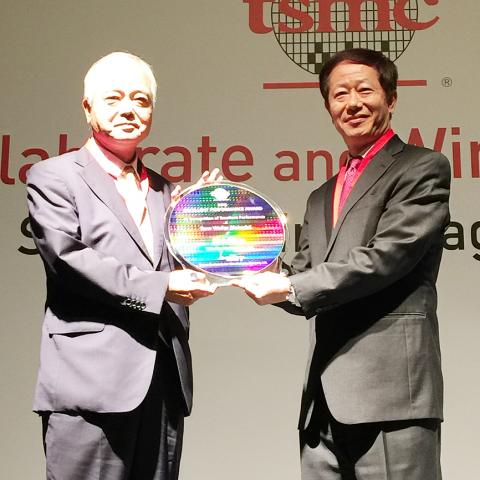Taiwan Semiconductor Manufacturing Co (TSMC, 台積電), the world’s largest contract chipmaker, yesterday said that it expects the overall semiconductor industry to return to growth next year after a prolonged period of inventory correction.
TSMC said that is a positive sign for the industry, which might head for a recovery next quarter.
“Inventory correction in the industry would be mostly finished by the end of this year,” TSMC co-chief executive officer Mark Liu (劉德音) said in a keynote speech during the company’s annual Supply Chain Management Forum in Hsinchu.

Photo: Hung Yu-fang, Taipei Times
“When we enter next year with a healthy level of inventory, we expect the semiconductor industry to return to growth trajectory,” Liu said.
Two months ago, Liu said he was not sure about the inventory correction issue and told investors that some uncertainties remained for the industry this quarter.
In October, TSMC cut its forecast for the world semiconductor industry’s revenue growth to zero this year from its previously estimated annual expansion of 3 percent.
The company is expected to outstrip the overall semiconductor industry next year, thanks to a market share gain from the 16-nanometer (nm) technology, Liu said, adding that the new technology would help the chipmaker continue to grow its annual revenue next year.
This year, TSMC is likely to grow its revenue by double digits from last year’s NT$762.81 billion (US$23.16 billion), partly because of the New Taiwan dollar’s depreciation against the US dollar and the company’s advances in technology, Liu said.
TSMC started mass producing 16nm chips in the third quarter and expects to launch a compact version of 16nm chips, mostly for low-end smartphones, in the second quarter of next year and start producing 10nm chips from the fourth quarter of next year, he said.
The company plans to start construction of a new production line in February at its Taichung factory, which is expected to produce 10nm chips to be used in various applications such as mobile phones, he said.
In its effort to push for more advanced technologies, TSMC is scheduled to start early production of 7nm chips in the first quarter of 2017 and is preparing to develop 5nm technology, Liu said.

HANDOVER POLICY: Approving the probe means that the new US administration of Donald Trump is likely to have the option to impose trade restrictions on China US President Joe Biden’s administration is set to initiate a trade investigation into Chinese semiconductors in the coming days as part of a push to reduce reliance on a technology that US officials believe poses national security risks. The probe could result in tariffs or other measures to restrict imports on older-model semiconductors and the products containing them, including medical devices, vehicles, smartphones and weaponry, people familiar with the matter said. The investigation examining so-called foundational chips could take months to conclude, meaning that any reaction to the findings would be left to the discretion of US president-elect Donald Trump’s incoming team. Biden

INVESTMENT: Jun Seki, chief strategy officer for Hon Hai’s EV arm, and his team are currently in talks in France with Renault, Nissan’s 36 percent shareholder Hon Hai Precision Industry Co (鴻海精密), the iPhone maker known as Foxconn Technology Group (富士康科技集團) internationally, is in talks with Nissan Motor Co’s biggest shareholder Renault SA about its willingness to sell its shares in the Japanese automaker, the Central News Agency (CNA) said, citing people it did not identify. Nissan and fellow Japanese automaker, Honda Motor Co, are exploring a merger that would create a rival to Toyota Motor Corp in Japan and better position the combined company to face competitive challenges around the world, people familiar with the matter said on Wednesday. However, one potential spanner in the works is

In a patch of South America rich in lithium, used to make batteries for electric cars and other tech, Bolivia is lagging its neighbors in the race to mine the key metal. An area called the “lithium triangle” which spills over the borders of Bolivia, Chile and Argentina is home to 60 percent of the world’s lithium reserves, according to the US Geological Survey. Bolivia claims to have Earth’s largest deposit of the metal, used to make rechargeable batteries for smartphones, laptops and other devices besides e-vehicles. However, Bolivia has undertaken only four pilot projects and is running just one

HON HAI LURKS: The ‘Nikkei’ reported that Foxconn’s interest in Nissan accelerated the Honda-merger effort out of fears it might be taken over by the Taiwanese firm Nissan Motor Co has become the latest buyout target in Japan as it explores a merger with Honda Motor Co and faces an overture from Hon Hai Precision Industry Co (鴻海精密), known as Foxconn Technology Group (富士康科技集團) internationally. Shares in Nissan yesterday jumped 24 percent, the most on record, to hit the daily limit, after the two Japanese automakers acknowledged that talks are ongoing to better position themselves for competitive challenges during a time of upheaval in the global auto industry. Foxconn — a Taipei-based manufacturer of iPhones, which has been investing heavily in factories to build electric vehicles — has also